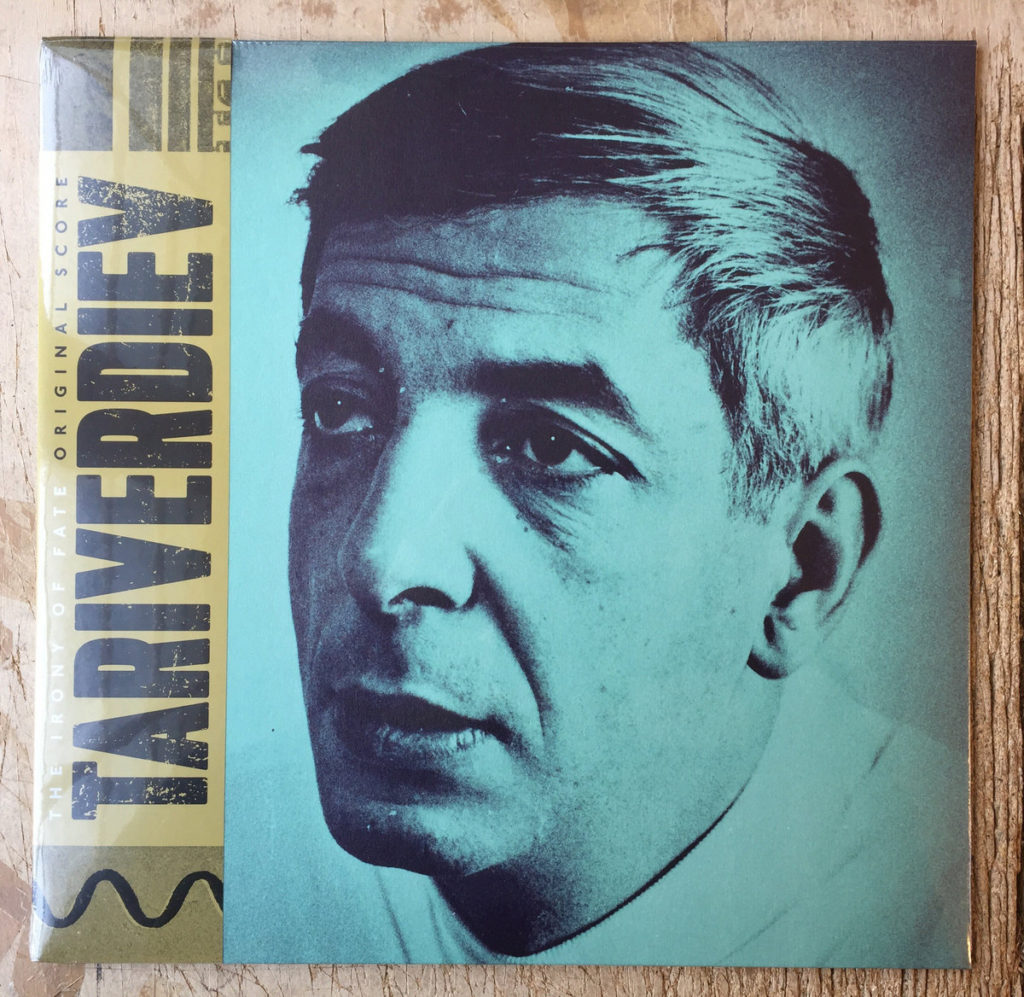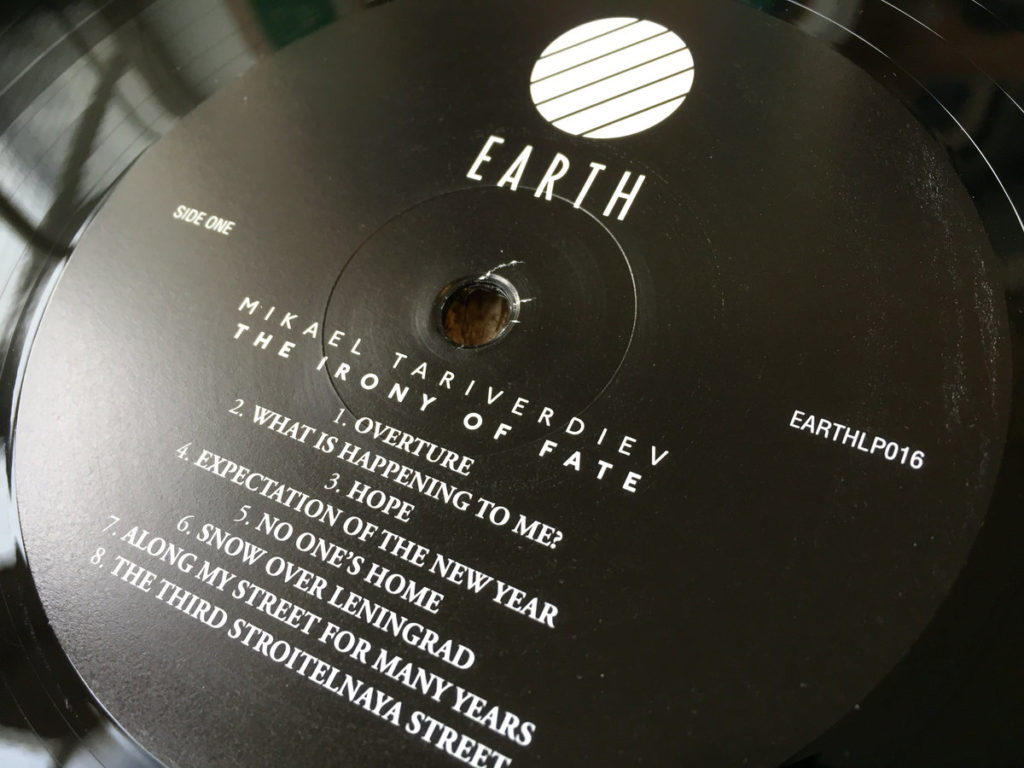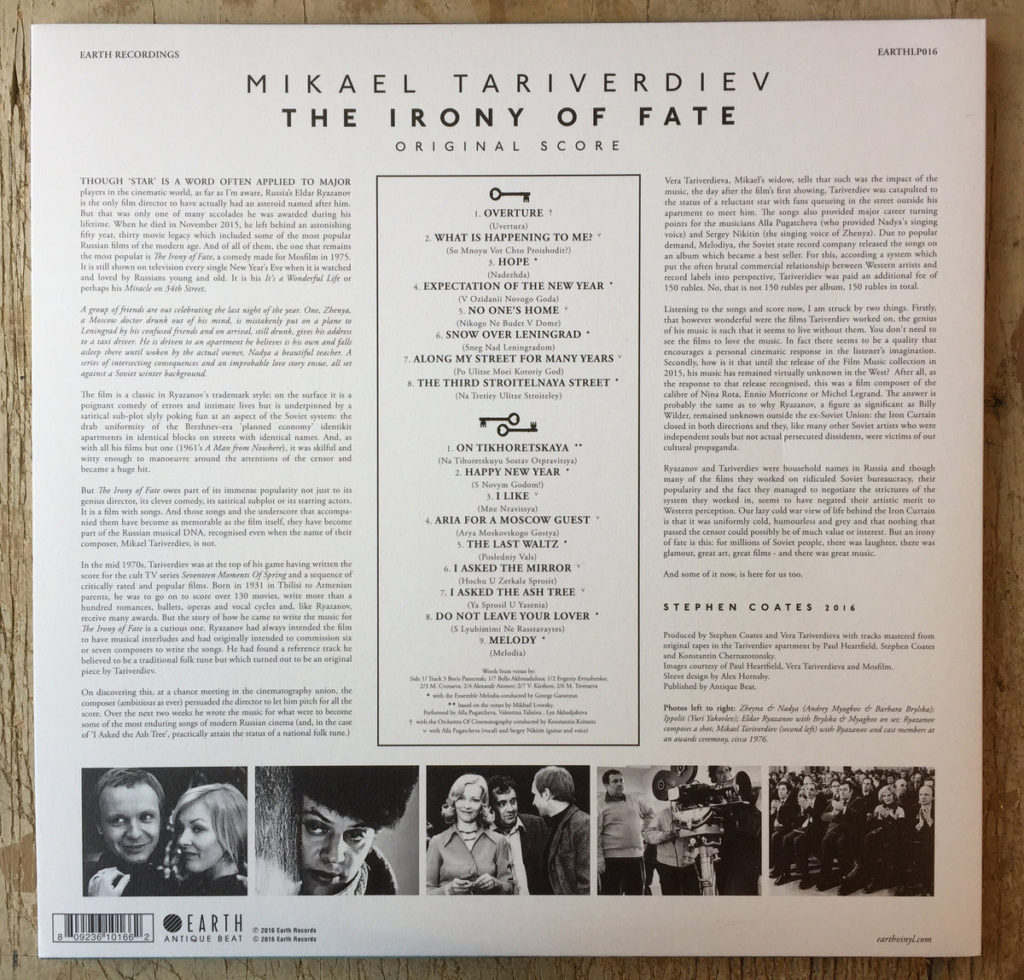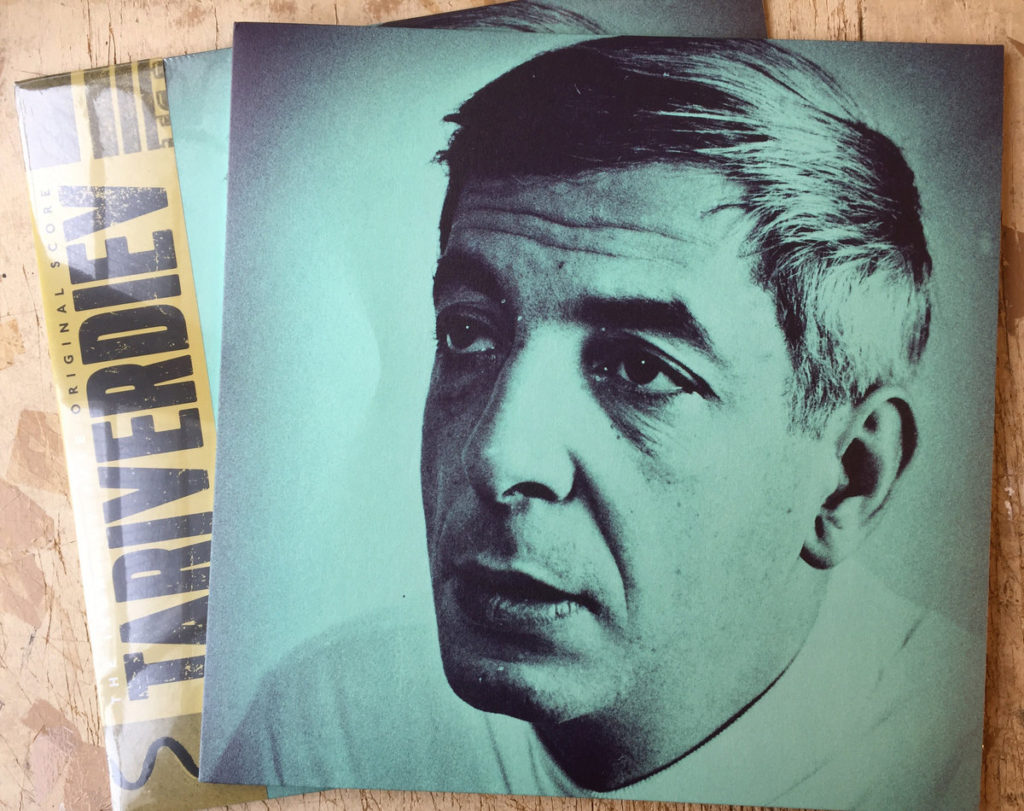



The Irony Of Fate
Mikael Tariverdiev
Following the award-nominated ‘Film Music’ collection of last year, comes the first in a series of stand-alone reissues documenting the astonishing body of work by Russian composer Mikael Tariverdiev. Single vinyl LP, remastered from Mikael’s own tapes, in tandem with his widow Vera Tariverdieva, complete with sleeve notes by Earth collaborator (and founder of Antique Beat, with whom this album is released) Stephen Coates.
£12.00 – £16.00
When he died in November 2015, Eldar Ryazanov left behind an astonishing fifty year, thirty movie legacy which included some of the most popular Russian films of the modern age. And of all of them, the one that remains the most popular is ‘The Irony of Fate’, a comedy made for MOS film in 1975.
But The Irony of Fate owes part of its immense popularity not just to its genius director, its clever comedy, its satirical subplot or its starring actors. It is a film with songs. And those songs and the underscore that accompanied them have become as memorable as the film itself, they have become part of the Russian musical DNA, recognised even when the name of their composer, Mikael Tariverdiev, is not.
In the mid 1970s, Tariverdiev was at the top of his game having written the score for the cult TV series ‘Seventeen Moments Of Spring’ and a sequence of critically rated and popular films. Born in 1931 in Tbilisi to Armenian parents, he was to go on to score over 130 movies, write more than a hundred romances, ballets, operas and vocal cycles and, like Ryazanov, receive many awards.
But the story of how he came to write the music for The Irony of Fate is a curious one. Ryazanov had always intended the film to have musical interludes and had originally intended to commission six or seven composers to write the songs. He had found a reference track he believed to be a traditional folk tune but which turned out to be an original piece by Tariverdiev. On discovering this, at a chance meeting in the cinematography union, the composer (ambitious as ever) persuaded the director to let him pitch for all the score. Over the next two weeks he wrote the music for what were to become some of the most enduring songs of modern Russian cinema (and, in the case of “I Asked the Ash Tree’, practically attain the status of a national folk tune).
Ryazanov and Tariverdiev were household names in Russia and though many of the films they worked on ridiculed Soviet bureaucracy, their popularity and the fact they managed to negotiate the strictures of the system they worked in, seems to have negated their artistic merit to Western perception. Our lazy cold war view of life behind the Iron Curtain is that it was uniformly cold, humourless and grey and that nothing that passed the censor could possibly be of much value or interest. But an irony of fate is this: for millions of Soviet people, there was laughter, there was glamour, great art, great films – and there was great music.
Following the award-nominated ‘Film Music’ collection of last year, comes the first in a series of stand-alone reissues documenting the astonishing body of work by Russian composer Mikael Tariverdiev. Single vinyl LP, remastered from Mikael’s own tapes, in tandem with his widow Vera Tariverdieva, complete with sleeve notes by Earth collaborator (and founder of Antique Beat, with whom this album is released) Stephen Coates.
Tracklist
A2 What Is Happening To Me? (so Mnoyu Vot Chto Proishodit?)
A3 Hope (Nadezhda)
A4 Expectation Of The New Year (V Ozidanii Novogo Goda)
A5 No One's Home (Nikogo Ne Budet V Dome)
A6 Snow Over Leningrad (Sneg Nad Leningradom)
A7 Along My Street For Many Years (Po Ulitse Moei Kotoriy God)
A8 The Third Stroitelnaya Street (Na Tretiey Ulitze Stroiteley)
B1 On Tikhoretskaya (Na Tihoretskuyu Sostav Otpravitsya)
B2 Happy New Year (S Novym Godom!)
B3 I Like (Mne Nravitsya)
B4 Aria For A Moscow Guest (Arya Moskovskogo Gostya)
B5 The Last Waltz (Posledniy Vals)
B6 I Asked The Mirror (Hochu U Zerkala Sprosit)
B7 I Asked The Ash Tree (Ya Sprosil U Yasenia)
B8 Do Not Leave Your Lover (S Lyubimimi Ne Rasstavaytes)
B9 Melody (Melodia)
Description
When he died in November 2015, Eldar Ryazanov left behind an astonishing fifty year, thirty movie legacy which included some of the most popular Russian films of the modern age. And of all of them, the one that remains the most popular is ‘The Irony of Fate’, a comedy made for MOS film in 1975.
But The Irony of Fate owes part of its immense popularity not just to its genius director, its clever comedy, its satirical subplot or its starring actors. It is a film with songs. And those songs and the underscore that accompanied them have become as memorable as the film itself, they have become part of the Russian musical DNA, recognised even when the name of their composer, Mikael Tariverdiev, is not.
In the mid 1970s, Tariverdiev was at the top of his game having written the score for the cult TV series ‘Seventeen Moments Of Spring’ and a sequence of critically rated and popular films. Born in 1931 in Tbilisi to Armenian parents, he was to go on to score over 130 movies, write more than a hundred romances, ballets, operas and vocal cycles and, like Ryazanov, receive many awards.
But the story of how he came to write the music for The Irony of Fate is a curious one. Ryazanov had always intended the film to have musical interludes and had originally intended to commission six or seven composers to write the songs. He had found a reference track he believed to be a traditional folk tune but which turned out to be an original piece by Tariverdiev. On discovering this, at a chance meeting in the cinematography union, the composer (ambitious as ever) persuaded the director to let him pitch for all the score. Over the next two weeks he wrote the music for what were to become some of the most enduring songs of modern Russian cinema (and, in the case of “I Asked the Ash Tree’, practically attain the status of a national folk tune).
Ryazanov and Tariverdiev were household names in Russia and though many of the films they worked on ridiculed Soviet bureaucracy, their popularity and the fact they managed to negotiate the strictures of the system they worked in, seems to have negated their artistic merit to Western perception. Our lazy cold war view of life behind the Iron Curtain is that it was uniformly cold, humourless and grey and that nothing that passed the censor could possibly be of much value or interest. But an irony of fate is this: for millions of Soviet people, there was laughter, there was glamour, great art, great films – and there was great music.
Following the award-nominated ‘Film Music’ collection of last year, comes the first in a series of stand-alone reissues documenting the astonishing body of work by Russian composer Mikael Tariverdiev. Single vinyl LP, remastered from Mikael’s own tapes, in tandem with his widow Vera Tariverdieva, complete with sleeve notes by Earth collaborator (and founder of Antique Beat, with whom this album is released) Stephen Coates.
